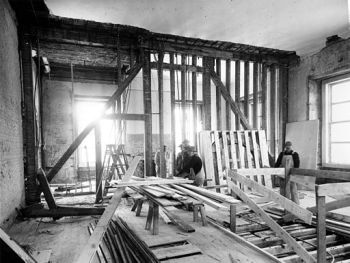What is holding you back?
 Thursday, April 3, 2014 at 6:19PM
Thursday, April 3, 2014 at 6:19PM 
I understand why people live with peeling wallpaper and ancient kitchens with drawers that jam and stick. It takes courage to venture beyond the planning stage. Once a renovation starts, there is no turning back. The old bathroom gets ripped out, but what looked good on paper may not proceed according to plan. Electricians, plumbers, and builders come into the mix. They each have an opinion and they often contradict each other. Maybe it’s easier to live with the crack in the bathtub and the toilet that flushes away 13 litres / 4 gallons of potable water with each use.
Word count: 327 Reading time: 1-2 minutes
Is an unknown result the reason some people fail to finish the big artistic projects they start? How many outlines of stories have I scribbled into my notebooks over the years? I love that playful stage. So I write the first scene. It’s satisfying to see the characters come to life, say and do things exactly the way I expected.
Deep into a manuscript, I often find that a story is not unfolding the way I expected. The electrician arrives on the scene and says that my protagonist has no spark. No one is getting a charge from her. The plumber informs me that my throughline is jammed and needs to be reworked. I need to rip out half of what I’ve written.
Sometimes the weaknesses are beyond repair. Better tear the old house down and salvage the parts. Other times I just need to pull out the rotted wall and replace it with something more substantial. The urge to destroy is also a creative urge according to Picasso. So really, when unexpected obstacles pop up in the narrative, isn’t that the time to muster the creative courage and smash what needs fixing?
Do you avoid writing your great novel because you know hard it’s going to be? Or do you have the perseverance to get through the project, so you lay out your blueprint and get started?
***
Photo from Wikimedia Commons: Bedroom and sitting room of the White House during the Renovation 2/27/1650 by Abbie Rowe from the US National Archives & Records Administration




